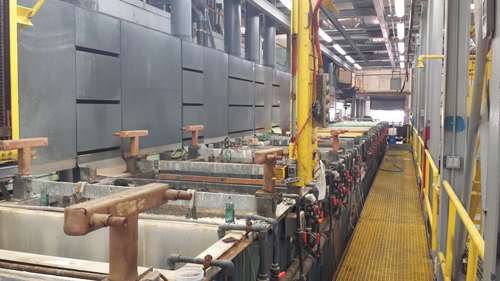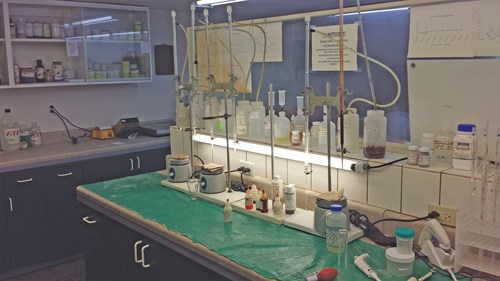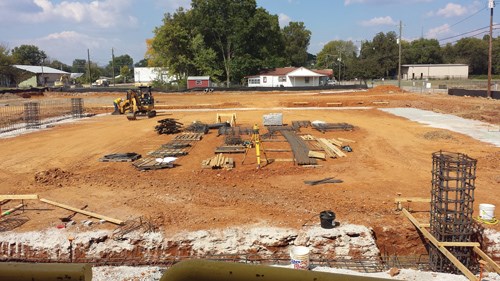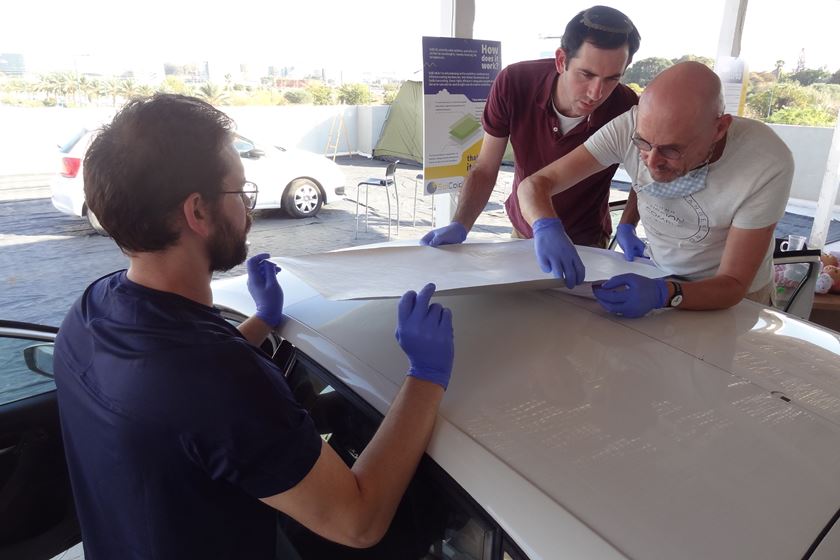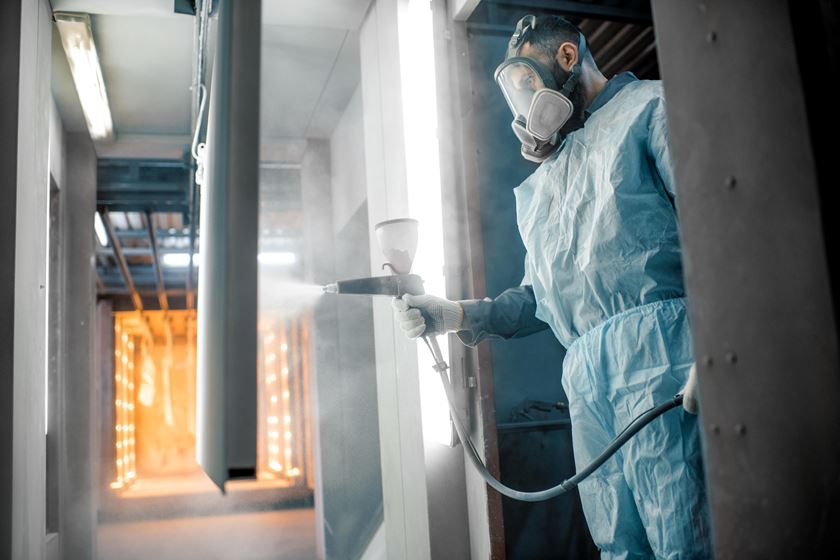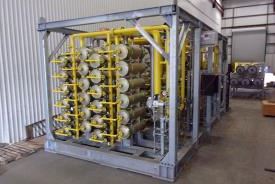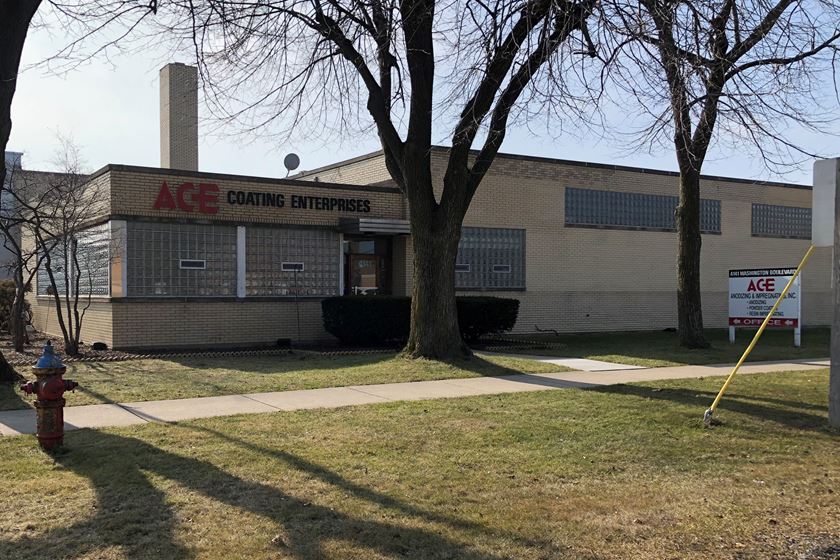New Life for Alabama Aerospace Finisher
Advanced Technical Finishing grows business with new certifications.
#education #pollutioncontrol #masking
Helping to design, build and oversee a $10 million metal finishing facility revitalization project isn’t the most monumental task Aaron Stinson has faced since he joined Advanced Technical Finishing in Huntsville, Alabama, a few years back.
Rather, the integration of quality control measures and a Nadcap certification program—and more importantly, getting the right employees on board to implement them—has been his chief undertaking.
Featured Content
“Without a doubt, getting the most qualified people in here and getting them to buy into all the things we need to be doing has been one of the biggest challenges we’ve faced,” ATF Vice President Stinson says. “But it’s that important to us, and so that it is the most crucial aspect of our plan for success.”
Such has been the challenge—and success—since ATF’s parent company, Advanced Technical Aerospace, purchased what was formerly J&A Finishing several years ago. It brought the company out of distress with plans to make it one of the top finishing shops in the U.S.
Three Companies
Advanced Technical Aerospace is a combination of three complementary aerospace service companies:
Advanced Technical Finishing, which specializes in top-quality customized treatments in the aerospace, medical, transportation, military and defense industries,
Advanced Technical Avionics, which focuses on aircraft structural and avionics maintenance and repair, custom cable and wire harness assemblies, custom box builds and electromechanical assemblies,
Advanced Cert Works, which provides solutions for civil aircraft certification needs, including both Federal Aviation Administration and international validation assistance.
ATF offers metal finishing services for aerospace, commercial, and military/defense industries nationwide, with operations specializing in anodizing in Mil-a-8625 Types 1, 2, 3; chemical conversion coat in Mil-dtl-5541 Type 1, 2; electroless nickel, zinc, phosphate (zinc and manganese), black oxide, passivation, sand and glass bead blasting, non-destructive testing, and also paint and powder coating.
It’s been a major step up from the J&A days, but that was the reason Advanced Technical Aerospace purchased the shop to begin with.
“Even though the facility had been here for more than 30 years, it really was a ‘mom-and-pop’ shop with mainly a commercial clientele,” Stinson says. “But we knew being right here in Huntsville, in the heart of the defense industry and all the arsenals, that we had to get Nadcap and other certifications because almost all the primes are requiring that.”
Who’s Who of Aerospace
Indeed, the Alabama area, especially around Huntsville, is a who’s who of industry names among the 300 aerospace and defense companies in Alabama, including Airbus, Sikorsky, Lockheed Martin, Bell Helicopter, Boeing, Northrop Grumman, GE Aviation, Airbus Military, GKN, General Dynamics, BAE Systems, Goodrich, Teledyne Brown, Pratt & Whitney and Raytheon.
The nearby Redstone Arsenal does work for almost all major programs, including the U.S. Army Materiel Command, U.S. Army Space and Missile Defense Command, Marshall Space Flight Center, the Missile Defense Agency, U.S. Army Aviation and Missile Command, two Program Executive Offices and the Defense Intelligence Agency.
That’s why ATF began painstaking accreditation processes when it took over the plant, including going after the Nadcap certification, which it received this past May.
“It’s an extensive process, but it is what we had to do in order to get the customers and the businesses we wanted to work with,” Stinson says. “And now that we’ve gone through the chemical process side of Nadcap, we want to get certified in all of our areas, especially in non-destructive testing.”
On the physical side of the operation, ATF is adding 16,000 square feet to the shop to help speed its processes and decrease turnaround times to meet customer demand for tight-tolerance, mission-critical work, says David Clarke, CFO at Advanced Technical Aerospace.
The project included upgrading the company’s existing anodizing lines to allow for increased capacity on Type I, II and III coatings, as well as installing new electroless nickel lines, a titanium Type II and III finishing line and a new, larger zinc processing line.
Hit the Ground Running
“We purchased the shop to build a world-class aerospace plating and finishing facility,” Clarke says. “It was important to us to hit the ground running and start to build a real solid foundation for the business and establish a baseline for the industry.”
Along with building the new addition, ATF also renovated its 3,000-square-foot painting facility with BR127 capabilities with large sandblasting booths, new temperature- and humidity-controlled paint booths; walk-in curing ovens for paint and powder coating, a 70-ton self-contained chiller unit, a DI water system for process lines that includes large reserve tanks, and an automatic Controlstik II rinse tank monitoring system that maintains optimal water quality and provides water savings of up to 85 percent.
“We had a strategic plan for how we wanted to renovate and expand, so we took things one step at a time and made sure to walk before we ran,” Clarke says. “It was a matter of getting existing systems refurbished, getting things cleaned up and functional, and bringing in new wherever we needed. That is the strategy we’ve been following these past two years.”
That strategy also included a new ventilation system that Clarke says creates a healthier and cleaner workplace for employees.
The surface treatments now offer by ATF are a perfect fit for winning new customers in the aerospace and defense industry:
Anodize Per MIL-A-8625: Type II Class I & II,
Type III Class I & II
Chromate Conversion per MIL-DTL-5541: Type 1 and 2 Class 1A and 3
Phosphate per MIL-DTL-16232
Zinc: Zinc phosphate per TT-C-490, Type I, III
Black Oxide per MIL-C-13924: Class I
Manganese Phosphate Per MIL -DTL-16232 Type M Class I, II, III, IV
Expanded Capabilities
With plating tanks measuring up to 48 by 60 by 80 inches, ATF says it can compete with any shops vying for work from the top aerospace and defense tiers. In addition, the company expanded its painting capabilities and added powder coating applications to serve whatever needs an OEM might have.
The plant’s chemical agent resistance coating (CARC) qualifies for Mil-DTL-53039 and MIL-DTL-53072 specs, as well the painting of dry film and solid film lubricants. The physical plant houses two walk-in paint booths of 10 and 8 feet in size, each with separate automatic conveyor lines running. Besides another walk-in oven that can handle temperatures up to 400°F, ATF has a Dri Quik infrared oven used for drying polyurethane enamel, polane and other light-gauge materials.
“It’s important to bring in new technologies that our customers expect us to have,” Clarke says.
ATF’s process of getting the plating, painting and powder coating operations up and running was eased by being a part of the Advanced Technical Aerospace family, which has had a footprint in aerospace and defense for many years.
“Finishing is a very complimentary operation to the other processes and organizations that are under our corporate entity,” Clarke says. “We’ve now built a machine that offers a very wide breadth of capabilities, but it also offers our customers many more options for which services they actually need.”
Clarke attributes much of ATF’s quick rise to Stinson and his efforts to get those certifications and accreditations as quickly as he has—almost at breakneck speed—while still meeting all the qualifications. “It’s really come together much faster than we had thought, thanks to what Aaron has done,” he says.
Non-Destructive Testing
On the project board now for Stinson is an expanded facility that will help grow ATF’s non-destructive testing capabilities, a function that company management feels is crucial to offer Tier 1s and other industries.
Non-destructive testing (NDT) operations will enable evaluation of properties of materials and components without causing damage—crucial in an industry such as aerospace where even small parts can costs big bucks. By offering NDT, the shop can be a higher value partner to manufacturers, saving them both money and time in material evaluation, troubleshooting and data acquisition.
“A lot of the orders that are starting to come in, now that we have Nadcap, call for non-destructive testing, often in fluorescent penetrant or in magnetic particle inspection, all of which we do,” Stinson says, adding that the sequence is usually a fluorescent penetrant, a chem film, and then a paint application. In addition, most of the orders call for complex masking, which ATF is also set up to do.
Here’s how it works. Fluorescent dye penetrates the metal surface. After wiping off the extra dye, an ultra violet light will detect any cracks or imperfection, where dye has seeped in, that might need to be reported by the manufacturer. In magnetic particle examinations, specialized equipment is used to find cracks, laps or seams on the surface of ferromagnetic materials.
“We really think there is a huge market for non-destructive testing,” Stinson says. “We already have in-house Level 3 testing capabilities, which significantly helps with prime approvals. So our goal is to tap into the market that we know exists in our region.”
Growing Company Culture
When ATF took over J&A operations, there were 20 employees on staff. The new coating operations and testing capabilities have grown that to 35 employees, with more scheduled to be hired and trained. “We are working hard to find people with the right mindset and culture ingrained in them so that they both know and respect the quality management system we are building here,” Clarke says.
He adds that although his company is growing quickly, it is at a rate they both planned and acticipated in the extremely competitive aerospace and defense industry.
“We are very excited about all the growth ATF is experiencing this year,” Clarke says. “Not only are we expanding both operations and capabilities, but our expansion is creating jobs. To help manage this growth, we have assembled a new management team composed of seasoned leaders with more than 120 years of combined industry experience.”
In addition to Stinson and Clarke, the new management team includes Scott Dennis as quality manager, Randy Reno as operations manager, and Josh Smithson as manager of NDT.
Process Management
Stinson says they won’t budge on getting the proper personnel working in the plant.
“It’s been the most difficult part of all that we have dealt with in the past few years,” he says. “It’s fairly easy to anodize or to plate a part, but when you are working with a Boeing part and there are certain specifications that need to be followed and met, it’s often hard to get that to sink in to someone who maybe has just done nickel plating with no spec. There is a process we follow.”
Fortunately, ATF has been able to find trained, qualified personnel who have a passion for demanding work required in aerospace and defense. And that’s made Stinson’s job a lot easier when he brings on critical aerospace jobs. “We want the technical work, we want the difficult stuff,” he says. “We know that is what will set us apart.”
For more information on Advanced Technical Finishing, please visit advancedtf.com, or call 256-534-8426.
RELATED CONTENT
-
Capital Cost Estimate Classes
Different levels of capital cost estimates provide key input for decisions over the life of surface finishing projects.
-
40 Under 40: Class of 2023
Products Finishing's 40 under 40 program recognizes nominated individuals driving the surface industry forward. Meet the class of 2023.
-
Education, Networking, Insights at 2023 Parts Cleaning Conference
Attend the Parts Cleaning Conference in Cleveland, Ohio on April 19th, 2023, for a comprehensive look into all things having to do with cleaning technology.


